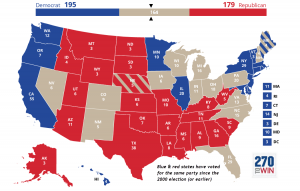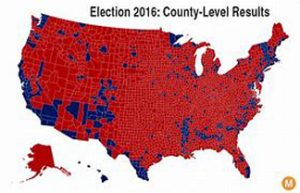֎ From NEWSY:
“A White nationalist movement that fueled a new rise for Europe’s far-right continues to gain momentum around the world and is helping to lure in and radicalize new recruits, according to terrorism experts. The French government dissolved the world’s first major “Identitarian” group in February, but not before its underlying ideology spread to at least 16 countries, including the U.S. White nationalist groups have become increasingly emboldened in their efforts to recruit. An explosion of propaganda, stickers and banners warn of a coming “invasion” of immigrants.”
The article documents the growth of far-right vigilantism around the world – perhaps because the numbers of immigrants grow due to collapsed economies and shifting climate and aided by social media. Here in the United States there is enough economy at the moment to curtail the use of field artillery and military assaults. Still, the political force is growing. The target will be the democratic concepts of any government: the government itself (January 6), voting (GOP?) and civil liberties (elect Donald again).
Mariner doesn’t believe that within the United States there will be a collapse of democracy – which already has happened within NATO and middle-eastern nations but for the US it will be a thorn in the side of progress through these difficult times.
֎ GOP: When is it time to put the ol’ horse down?
Here’s the current breakdown of all Senators by age:
80s: 7
70s: 24
60s: 38
50s: 19
40s: 12
So around a third are aged over 70 and around two thirds are over 60.
Term limits would solve the problem. A maximum of three six year terms should be enough to make a decent contribution (mariner believes there should be an age limit as well). The point is this: The GOP perception of conservative government hasn’t changed since 1980. It hasn’t changed because the old fogeys, who grew up and established their career in a time that no longer exists, are still in charge of GOP politics. The turtle is 79; mariner’s senator is 87. Don’t forget our Presidents: Donald left office at 75 and Joe is 78.
The entire Senate is over the hill; of 100 senators, 69 are over 60! What saves the democrats from the same extent of criticism is that the democrats always are trying to change something rather than defend the status quo.
The coronavirus, introduced by godly forces tired of lagging progress, has short-sheeted the GOP. The GOP quickly must remake their bed – much more quickly than the normal evolution of economics and culture would require.
In case a reader doesn’t know how to put the ol’ horse down, it is quick and bloodless: don’t vote for them. Not only that, vote for someone under 55.
֎ Make note of the term XR (extended reality – a term from gaming corporations that has become a term meaning take as much human activity and responsibility as possible and put it on the Internet). Many corporations are redefining their dream income model to be completely online and, this is the interesting part, be the sole owner of entire segments of society. AirB&B sees itself as the Department of Housing and Urban Development for all homes in the US; Uber imagines that all cars – repeat, ALL cars – will belong to Uber. Already Zuckerberg is challenging antitrust lawsuits by saying the Internet is the competition. All money, too, will be bitcoins. A big question: which corporation will own all the banks and credit card companies?
So the government will have a lot less to worry about since corporations will automate everything using proprietary software. Who will own all the votes?
Ancient Mariner




